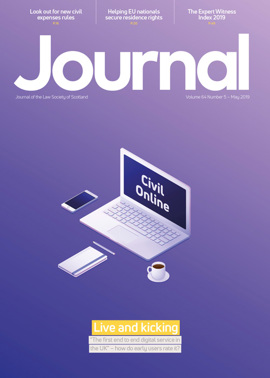To name or not to name?

As with other areas of practice (such as family law: see Journal, January 2019, 34), in employment law there is an exception to the general rule that court or tribunal hearings must be held in public, or in this case at least two such exceptions. Rule 50 of the Employment Tribunals (Constitution and Rules of Procedure) Regulations 2013 deals with privacy and restrictions on disclosure, and rule 94 with conducting proceedings wholly or partly in private in the interests of national security. In this briefing I shall deal with rule 50 orders.
The essence of rule 50 is that a tribunal may, on its own initiative or on application by a party, make a restricted reporting order (RRO) or an anonymity order (AO) to prevent or restrict the public disclosure of any aspect of proceedings. It can do so where it considers this necessary in the interests of justice, or to protect the Convention rights of any person, or in the circumstances set out in s 10A of the Employment Tribunals Act 1996.
Section 10A enables an ET to sit in private to hear evidence which, in its opinion, is likely to consist of information that could not be disclosed without contravening a prohibition imposed by or by virtue of an enactment; information communicated to the witness in confidence or obtained due to a confidence placed in the witness; and information that, if disclosed, would be likely to cause substantial injury to any undertaking in which the witness works. (There are some exceptions in respect of collective bargaining.)
The ET can also make an order that the identities of specified individuals (not restricted to the parties) should not be disclosed to the public. This can be done in whatever way the tribunal considers necessary including anonymisation, which could encompass references to individuals during the hearing and/or in any documents generated by the tribunal, whether in a judicial or an administrative capacity. In addition, it may order that measures are taken to prevent witnesses at a public hearing being identifiable by members of the public. The Act specifically refers to cases involving allegations of sexual offences or sexual misconduct in respect of RROs.
More requests
Over recent months employment practitioners may have seen an increase in the number of decisions reported anonymously as well as in requests from clients or opponents for hearings to be private or judgments anonymous. The reason may well be the relative ease by which the public can now access ET decisions online (Employment Appeal Tribunal decisions have been available for a number of years and are commonly reported), coupled with the increased awareness of harassment in the workplace.
A case heard in July 2018, only recently made available (A, B v X, Y, Times Newspapers Ltd UKEAT/0113/18/JOJ) provides a convenient précis of the relevant case law. It concerned sexual harassment claims by two employees against their employer (the first respondent) and the alleged harasser as an individual (the second respondent), apparently a “household name”. The allegations were denied.
Both respondents sought RROs and AOs, having particular regard to the second respondent’s ECHR article 8 right of privacy, including honour and reputation. The claimants would remain anonymous under s 1 of the Sexual Offences (Amendment) Act 1992, which provides for a lifetime prohibition on publication of any matter likely to lead to the identification of alleged victims of sexual offences. However, they were still concerned about their identities becoming public due to press attention, and also applied for AO orders. At first instance the ET declined to make any AO, but made an order continuing the RRO until after the remedy decision (if any).
Amongst other things, the ET held it not workable to have an RRO in respect of one side only. If one party could be identified it was likely that all could be. The allegations were “serious” and “shocking”; an RRO would enable a hearing to take place without fear of misreporting and maintain the “innocent until proven guilty” line.
Both parties appealed. The claimants’ position was that, given the ET’s refusal to grant AOs in their favour, no RRO should be granted either. The ET effectively gave no weight to the principle of open justice. The EAT sent the case back to a freshly constituted ET to consider whether an RRO was appropriate, but dismissed the claimants’ appeal against the refusal of the AO.
The tension between the refusal to grant an AO and the protection under the 1992 Act (not to have any identifying details published) did not go unnoticed. The EAT judge commented that “the likelihood” was that no judgments would appear online before the parties had the chance to make further submissions on rule 50. This may well be the subject of future debate.
In this issue
- Claiming under the advance payment scheme
- Time for a written constitution
- New form F9: worth the wait?
- Wedded to a matrimonial property regime
- Brexit divorce set to increase UK's “skype families”
- Corporate personality: Justice v Doctrine
- Reading for pleasure
- The Law Society of Scotland Expert Witness Index 2019
- Opinion: Judith Robertson
- Book reviews
- Profile: Michael Clancy
- President's column
- Is your legal data being held to ransom?
- People on the move
- Sign up – log in – action!
- Frozen out?
- Taxing times for litigators
- DNA analysis: when research just isn’t enough
- Brexit focus: EU citizen settlement remedies
- Why employers should report on wellbeing
- 3% – and then what?
- 1,000 days of mediation
- Barred from acting
- To name or not to name?
- Enter the “What I Think”
- Fixed penalties and fair trials
- Auto-enrolment: keeping employers on their toes
- Scottish Solicitors' Discipline Tribunal
- Vulnerable accused: a need for knowledge
- Burdens and who can enforce them
- Convener’s final bow
- Public policy highlights
- TCSP review update
- Westminster: answering the call
- Accredited paralegal practice area highlight: family law
- Accredited Paralegal Committee profile
- Nyona named star paralegal
- Ask Ash
- Moving nightmares part 2
- Complaints: seeking consistent practice
- Morally bankrupt?
- For the elderly: how SFE works
- Standing up to challenge






